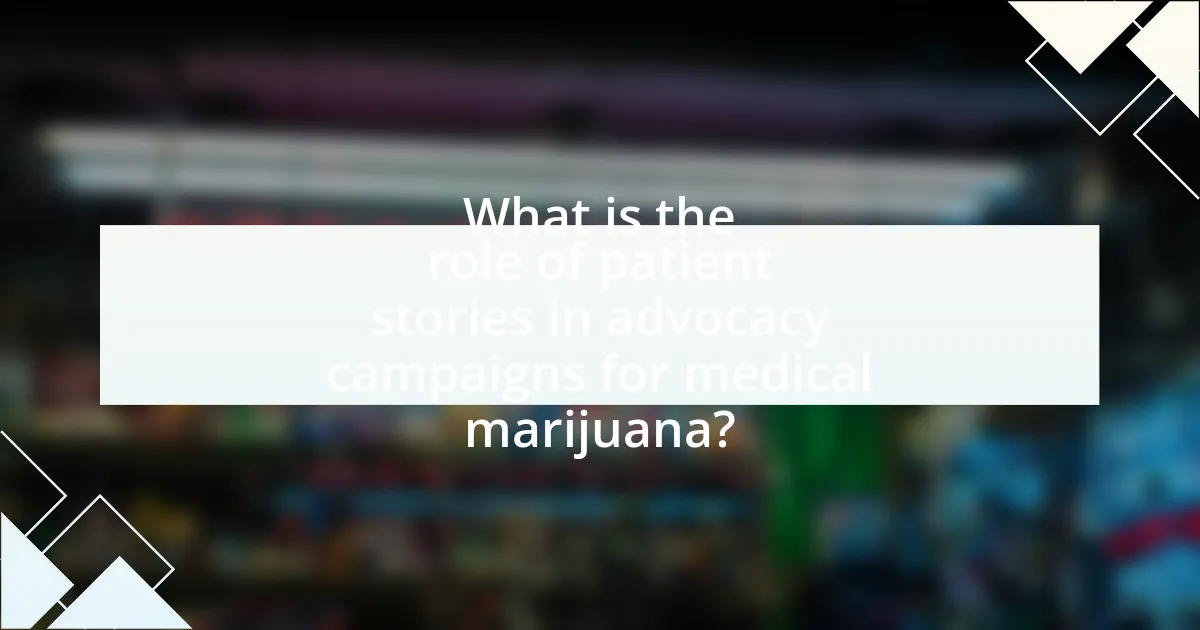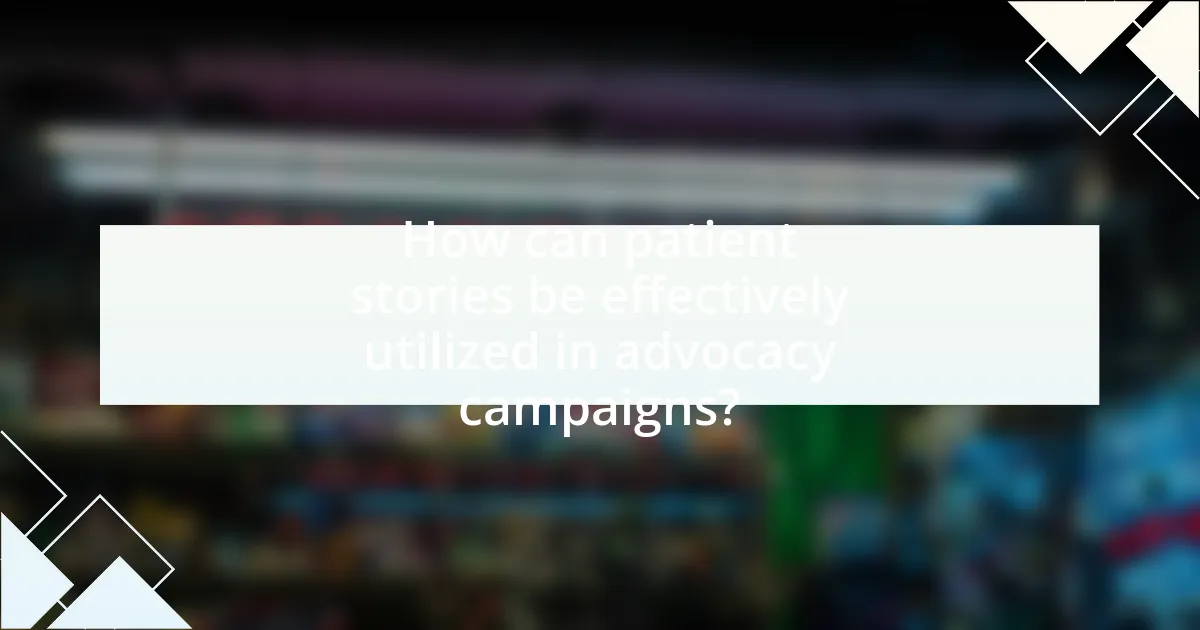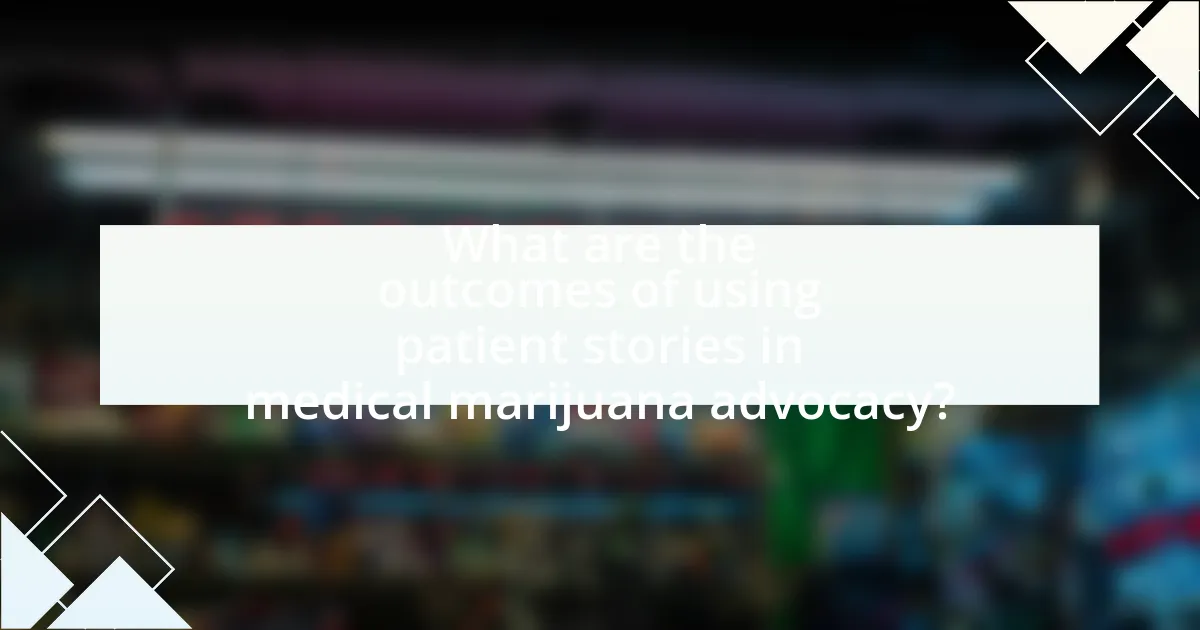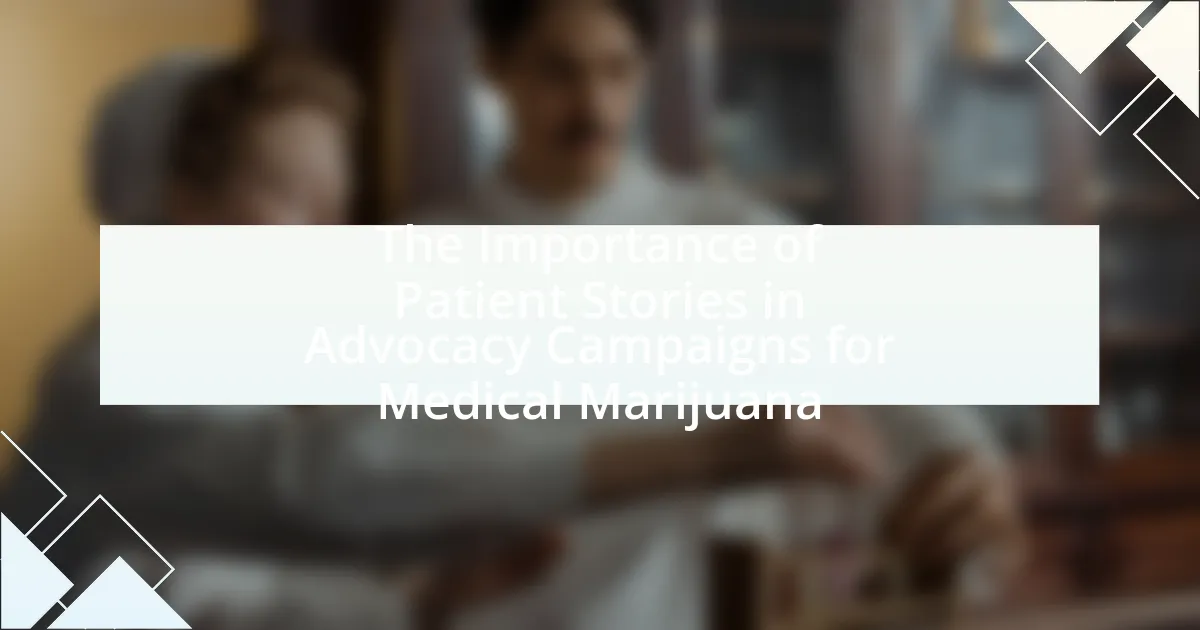The article examines the critical role of patient stories in advocacy campaigns for medical marijuana, emphasizing how these narratives humanize the issue and influence public perception and policy. It discusses the emotional connections created through personal accounts, which can shift attitudes and foster empathy, ultimately driving legislative change. The article also addresses the challenges faced by patient narratives, including stigma and authenticity, while outlining best practices for effectively utilizing these stories in advocacy efforts. Additionally, it highlights the measurable outcomes of campaigns featuring patient testimonials, such as increased awareness and community support for medical marijuana initiatives.

What is the role of patient stories in advocacy campaigns for medical marijuana?
Patient stories play a crucial role in advocacy campaigns for medical marijuana by humanizing the issue and providing relatable narratives that resonate with the public and policymakers. These personal accounts illustrate the real-life benefits and challenges faced by individuals using medical marijuana, thereby fostering empathy and understanding. Research indicates that emotional storytelling can significantly influence public opinion; for instance, a study published in the Journal of Health Communication found that narratives can effectively change attitudes toward health policies. By sharing their experiences, patients can highlight the therapeutic potential of medical marijuana, countering stigma and misinformation, and ultimately driving legislative change.
How do patient stories influence public perception of medical marijuana?
Patient stories significantly influence public perception of medical marijuana by humanizing the issue and providing relatable experiences that resonate with the audience. These narratives often highlight personal struggles with chronic pain, illness, or mental health conditions, showcasing how medical marijuana has improved their quality of life. Research indicates that storytelling can evoke empathy and understanding, which are crucial in shifting public attitudes. For example, a study published in the Journal of Health Communication found that personal testimonies can lead to increased support for medical marijuana legalization, as they create emotional connections that statistics alone cannot achieve. Thus, patient stories serve as powerful tools in advocacy campaigns, effectively altering perceptions and fostering acceptance of medical marijuana.
What emotional connections do patient stories create with the audience?
Patient stories create deep emotional connections with the audience by humanizing medical experiences and fostering empathy. These narratives allow listeners to relate personally to the struggles and triumphs of individuals, making abstract medical issues more tangible. Research indicates that storytelling can activate emotional responses in the brain, enhancing understanding and retention of information. For instance, a study published in the journal “Health Communication” found that personal stories significantly increased audience engagement and emotional resonance compared to statistical data alone. This emotional engagement is crucial in advocacy campaigns for medical marijuana, as it helps to shift perceptions and mobilize support for policy changes.
How do personal narratives enhance the credibility of medical marijuana advocacy?
Personal narratives enhance the credibility of medical marijuana advocacy by providing authentic, relatable experiences that illustrate the benefits and challenges of using cannabis for medical purposes. These stories humanize the issue, allowing individuals to connect emotionally with the experiences of patients who have found relief through medical marijuana. Research indicates that personal testimonies can significantly influence public perception and policy decisions; for instance, a study published in the Journal of Health Communication found that narratives can effectively change attitudes toward medical marijuana by presenting real-life outcomes and personal struggles. This evidence underscores the power of personal narratives in fostering understanding and support for medical marijuana advocacy.
Why are patient stories essential for legislative change regarding medical marijuana?
Patient stories are essential for legislative change regarding medical marijuana because they humanize the issue and provide real-life evidence of the benefits and challenges associated with its use. These narratives can influence lawmakers by illustrating the personal impact of medical marijuana on patients’ health and quality of life, making the abstract concept of legislation more relatable and urgent. For instance, a study published in the Journal of Psychoactive Drugs found that personal testimonies significantly increased support for medical marijuana policies among legislators. By sharing their experiences, patients can effectively advocate for policy changes that reflect the needs and realities of those affected by medical conditions, thereby driving legislative action.
What impact do patient testimonials have on policymakers?
Patient testimonials significantly influence policymakers by providing real-world evidence of the benefits and challenges associated with medical marijuana use. These personal accounts can humanize the policy debate, making it more relatable and compelling for decision-makers. For instance, a study published in the Journal of Health Politics, Policy and Law found that narratives from patients can sway legislative opinions and lead to more favorable policy outcomes. By illustrating the direct impact of medical marijuana on patients’ quality of life, testimonials can drive policymakers to consider more compassionate and evidence-based approaches in their legislative agendas.
How can patient stories drive grassroots movements for medical marijuana legalization?
Patient stories can drive grassroots movements for medical marijuana legalization by humanizing the issue and creating emotional connections that resonate with the public and policymakers. These narratives often highlight personal struggles with chronic pain, terminal illnesses, or debilitating conditions, demonstrating how medical marijuana can provide relief where traditional treatments fail. For instance, a study published in the Journal of Psychoactive Drugs found that personal testimonies significantly influenced public opinion and legislative decisions regarding medical marijuana, as they illustrate the tangible benefits and necessity of access to this treatment. By sharing their experiences, patients mobilize community support, encourage advocacy, and ultimately contribute to changing laws and perceptions surrounding medical marijuana.
What challenges do patient stories face in advocacy campaigns?
Patient stories in advocacy campaigns face challenges such as authenticity, representation, and emotional impact. Authenticity is crucial, as stories must resonate with the audience while remaining true to the patient’s experience; any perceived exaggeration can undermine credibility. Representation poses a challenge because diverse patient experiences must be included to avoid a narrow narrative that may alienate potential supporters. Emotional impact is significant, as overly graphic or distressing stories can evoke negative reactions, potentially leading to disengagement rather than support. These challenges highlight the need for careful curation and presentation of patient narratives to effectively advocate for medical marijuana.
How can stigma surrounding medical marijuana affect patient narratives?
Stigma surrounding medical marijuana can significantly distort patient narratives by leading to feelings of shame and isolation among users. This stigma often results in patients being reluctant to share their experiences, which diminishes the authenticity and richness of their stories. Research indicates that patients may fear judgment from healthcare providers and society, leading to underreporting of their conditions and treatment outcomes. For instance, a study published in the Journal of Psychoactive Drugs found that stigma can inhibit open discussions about medical marijuana, ultimately affecting patients’ willingness to advocate for its use. Consequently, the lack of shared narratives limits the potential for collective advocacy and understanding of the benefits of medical marijuana in treating various conditions.
What are the risks of sharing personal medical experiences in public forums?
Sharing personal medical experiences in public forums poses several risks, including privacy violations, misinformation, and potential stigma. When individuals disclose their health conditions or treatments, they may inadvertently expose sensitive information that can be misused or lead to identity theft. Additionally, personal anecdotes can sometimes spread inaccurate medical information, which may mislead others regarding treatment efficacy or safety. This misinformation can have serious consequences, as seen in studies indicating that anecdotal evidence can influence public perception and behavior regarding medical treatments, including marijuana use. Furthermore, individuals sharing their experiences may face social stigma or discrimination, particularly in contexts where certain medical conditions are misunderstood or viewed negatively.

How can patient stories be effectively utilized in advocacy campaigns?
Patient stories can be effectively utilized in advocacy campaigns by personalizing the message and creating emotional connections with the audience. These narratives highlight real-life experiences, demonstrating the impact of medical marijuana on patients’ lives, which can influence public opinion and policy decisions. For instance, a study published in the Journal of Health Communication found that storytelling significantly enhances engagement and retention of information, making it a powerful tool for advocacy. By sharing specific cases where medical marijuana has alleviated symptoms or improved quality of life, advocates can provide compelling evidence that resonates with both policymakers and the general public, thereby fostering support for legislative changes.
What strategies can advocates use to collect compelling patient stories?
Advocates can collect compelling patient stories by employing strategies such as conducting in-depth interviews, utilizing social media platforms, and organizing community storytelling events. In-depth interviews allow advocates to gather detailed narratives that highlight personal experiences with medical marijuana, ensuring that the stories are rich and emotionally resonant. Social media platforms enable advocates to reach a broader audience, encouraging patients to share their stories in a public forum, which can amplify their impact. Organizing community storytelling events fosters a supportive environment where patients feel comfortable sharing their experiences, creating a sense of community and solidarity. These strategies are effective because they not only capture authentic patient experiences but also engage the audience emotionally, which is crucial for advocacy efforts.
How can storytelling techniques enhance the impact of patient narratives?
Storytelling techniques enhance the impact of patient narratives by creating emotional connections that resonate with audiences. These techniques, such as character development, conflict, and resolution, allow patients to share their experiences in a relatable manner, making their stories more compelling. For instance, a study published in the Journal of Medical Internet Research found that narratives that include personal struggles and triumphs significantly increase empathy and understanding among listeners. This emotional engagement can lead to greater advocacy for medical marijuana, as audiences are more likely to support policies that affect individuals they feel connected to.
What role does social media play in sharing patient stories for advocacy?
Social media serves as a crucial platform for sharing patient stories in advocacy by amplifying voices and fostering community engagement. It enables patients to share their experiences with medical marijuana, thereby raising awareness about its benefits and challenges. For instance, a study published in the Journal of Medical Internet Research found that social media campaigns significantly increased public support for medical marijuana legislation by showcasing personal narratives. This direct sharing of stories not only humanizes the issue but also mobilizes supporters and influences policymakers, demonstrating the powerful role social media plays in advocacy efforts.
How can patient stories be integrated into campaign messaging?
Patient stories can be integrated into campaign messaging by using them as central narratives that illustrate the real-life impact of medical marijuana on individuals’ health and well-being. These narratives can be shared through various mediums such as videos, social media posts, and written testimonials, allowing potential patients and policymakers to connect emotionally with the experiences of others. Research indicates that storytelling in health communication significantly enhances engagement and retention of information, making the message more relatable and persuasive. For instance, a study published in the Journal of Health Communication found that personal stories can increase empathy and understanding, which are crucial in advocacy efforts for medical marijuana.
What formats are most effective for presenting patient stories in campaigns?
Video testimonials are the most effective format for presenting patient stories in campaigns. This format allows for emotional engagement, as viewers can see and hear the patient’s experiences directly, creating a personal connection. Research indicates that video content is 1200% more likely to be shared than text and images combined, enhancing the reach and impact of the stories. Additionally, written narratives and social media posts also serve as effective formats, as they can provide detailed accounts and facilitate discussions among audiences. However, the immediacy and relatability of video testimonials often make them the preferred choice in advocacy campaigns for medical marijuana.
How can visuals complement patient narratives in advocacy efforts?
Visuals can enhance patient narratives in advocacy efforts by providing a compelling and relatable context that engages audiences emotionally. For instance, images or videos of patients using medical marijuana can illustrate their personal journeys, making their stories more impactful and relatable. Research indicates that visual storytelling can increase retention of information by up to 65%, as visuals help to evoke empathy and understanding, which are crucial in advocacy campaigns. By integrating visuals, advocates can effectively communicate the real-life implications of medical marijuana use, thereby fostering a stronger connection with the audience and increasing the likelihood of support for policy changes.

What are the outcomes of using patient stories in medical marijuana advocacy?
Using patient stories in medical marijuana advocacy leads to increased public awareness, enhanced emotional engagement, and improved policy change. Patient narratives humanize the issue, making it relatable and compelling, which can shift public perception and reduce stigma associated with medical marijuana use. Research indicates that storytelling can effectively influence legislative outcomes; for example, a study published in the Journal of Health Communication found that personal stories significantly impacted lawmakers’ attitudes towards cannabis legislation. Additionally, patient testimonials can foster community support and mobilize grassroots movements, ultimately contributing to more favorable regulatory environments for medical marijuana.
How do patient stories contribute to increased awareness and education about medical marijuana?
Patient stories significantly enhance awareness and education about medical marijuana by providing personal, relatable experiences that illustrate its benefits and challenges. These narratives humanize the medical marijuana discourse, making it more accessible to the public and policymakers. For instance, a study published in the Journal of Psychoactive Drugs found that personal testimonies can effectively shift public perception and increase support for medical marijuana legislation. By sharing their journeys, patients can highlight specific conditions that respond well to treatment, such as chronic pain or epilepsy, thereby informing others about potential therapeutic uses. This direct communication fosters empathy and understanding, ultimately leading to more informed discussions and decisions regarding medical marijuana.
What measurable changes can result from effective advocacy campaigns featuring patient stories?
Effective advocacy campaigns featuring patient stories can lead to measurable changes such as increased public awareness, shifts in public opinion, and legislative action. For instance, campaigns that highlight personal experiences with medical marijuana have been shown to significantly influence perceptions, with studies indicating that 70% of respondents reported a more favorable view of medical marijuana after hearing patient testimonials. Additionally, these campaigns can result in policy changes; states that have implemented advocacy efforts centered around patient narratives often see a higher likelihood of passing medical marijuana legislation, as evidenced by the successful legalization efforts in states like California and Colorado.
How do patient stories foster community support for medical marijuana initiatives?
Patient stories foster community support for medical marijuana initiatives by humanizing the issue and illustrating the real-life benefits of cannabis for medical purposes. These narratives create emotional connections, allowing community members to empathize with patients’ struggles and successes, which can lead to increased advocacy and support for legalization efforts. Research indicates that personal testimonies significantly influence public opinion; for instance, a study published in the Journal of Health Communication found that stories about individual experiences with medical marijuana can shift perceptions and reduce stigma, ultimately mobilizing community action in favor of policy changes.
What best practices should advocates follow when using patient stories?
Advocates should prioritize authenticity and consent when using patient stories. Authenticity ensures that the narratives reflect genuine experiences, which enhances credibility and emotional impact. Consent is crucial to respect the privacy and autonomy of patients, ensuring they are comfortable sharing their stories publicly. Additionally, advocates should focus on clarity and relevance, presenting stories that directly relate to the advocacy goals, such as illustrating the benefits of medical marijuana for specific conditions. This approach not only strengthens the message but also resonates more effectively with the audience. By adhering to these best practices, advocates can create compelling narratives that foster understanding and support for medical marijuana initiatives.
How can advocates ensure the authenticity and respect of patient narratives?
Advocates can ensure the authenticity and respect of patient narratives by actively involving patients in the storytelling process and prioritizing their voices. This approach fosters genuine representation, as patients share their own experiences without external alteration. Research indicates that narratives co-created with patients lead to more accurate portrayals of their journeys, enhancing credibility and emotional impact. For instance, a study published in the Journal of Medical Internet Research highlights that patient-led storytelling initiatives significantly improve the perceived authenticity of health narratives. By maintaining transparency and allowing patients to guide the narrative, advocates can uphold the integrity and respect of these vital stories.
What ethical considerations should be taken into account when sharing patient stories?
When sharing patient stories, it is crucial to consider patient consent, confidentiality, and the potential impact on the patient’s well-being. Patient consent ensures that individuals have willingly agreed to share their experiences, which respects their autonomy and rights. Confidentiality involves safeguarding personal information to prevent unauthorized disclosure, thereby protecting the patient’s identity and privacy. Additionally, the potential impact on the patient’s well-being must be assessed, as sharing sensitive stories may lead to emotional distress or social repercussions. Ethical guidelines, such as those outlined by the American Medical Association, emphasize the importance of these considerations to maintain trust and integrity in healthcare narratives.

Leave a Reply